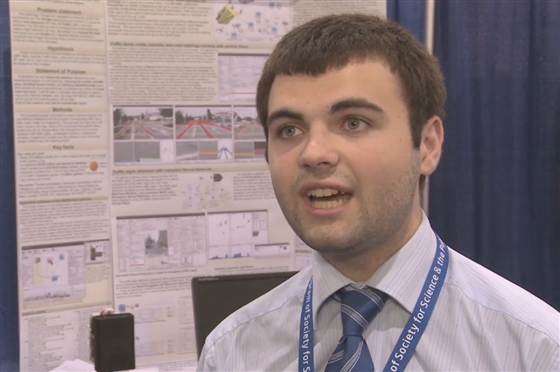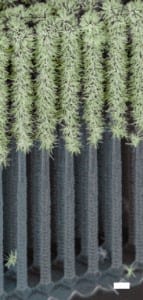
“This study is a breakthrough for our research group after years of work.”
When we reduce the production of the enzyme in mice, the development of all the clinical symptoms of progeria is reduced or blocked. We have also studied cultured cells from children with progeria, and can see that when the enzyme is inhibited, the growth of the cells increases by the same mechanism as in mouse cells,” says Martin Bergö, Professor at the Sahlgrenska Academy, University of Gothenburg and research director at the Sahlgrenska Cancer Center.
Progeria is a rare genetic childhood disorder characterized by the appearance of accelerated aging. The classical form of progeria, called Hutchinson-Gilford Progeria Syndrome (HGPS), is caused by a spontaneous mutation, which means that it is not inherited from the parents.
Children with HGPS usually die in their teenage years from myocardial infarction and stroke.
The progeria mutation occurs in the protein prelamin A and causes it to accumulate in an inappropriate form in the membrane surrounding the nucleus. The target enzyme, called ICMT, attaches a small chemical group to one end of prelamin A. Blocking ICMT, therefore, prevents the attachment of the chemical group to prelamin A and significantly reduced the ability of the mutant protein to induce progeria.
“We are collaborating with a group in Singapore that has developed candidate ICMT inhibitor drugs and we will now test them on mice with progeria. Because the drugs have not yet been tested in humans, it will be a few years before we know whether these drugs will be appropriate for the treatment of progeria,” Martin Bergö explains.
The Latest Bing News on:
Progeria
- Zydus Lifesciences bags USFDA nod for Dapsone Gel for acne treatmenton May 9, 2024 at 2:22 am
Ahmedabad: Zydus Lifesciences Limited has received final approval from the United States Food and Drug Administration (USFDA) to market Dapsone Gel, 7.5%, (USRLD: Aczone Gel 7.5%).Dapsone Gel ...
- Researchers uncover DNA repair mechanism that could yield treatments for cancer, premature agingon May 8, 2024 at 10:47 am
Mekhail notes the discovery is also relevant to premature aging conditions like progeria. The rare genetic condition causes rapid aging within the first two decades of life, commonly leading to early ...
- Lantern Pharma and Oregon partner to develop cancer treatmenton May 6, 2024 at 6:09 am
Lantern Pharma has entered into a partnership with Oregon for optimising the development of XCE853, through an AI-driven approach.
- Sentynl acquires Eiger’s Zokinvy for progeria treatmenton May 6, 2024 at 4:09 am
Zydus Lifesciences subsidiary Sentynl Therapeutics has announced the worldwide acquisition of the Zokinvy (lonafarnib) programme from Eiger BioPharmaceuticals for the treatment of progeria. Zokinvy is ...
- Sentynl, a Zydus Group company acquires Zokinvy to treat Hutchinson-Gilford progeria syndrome from Eiger BioPharmaon May 5, 2024 at 8:30 pm
Sentynl, a Zydus Group company acquires Zokinvy to treat Hutchinson-Gilford progeria syndrome from Eiger BioPharma: Our Bureau, Mumbai Monday, May 6, 2024, 09:00 Hrs [IST] Sentynl ...
- Zydus acquires rights for progeria treatmenton May 5, 2024 at 4:04 pm
Zydus Lifesciences' Sentynl Therapeutics Inc acquires global proprietary rights for Zokinvy, the first USFDA-approved treatment for progeria. Learn about the rare disease and the latest advancements ...
- Sentynl Therapeutics, a Zydus company acquires Zokinvy for Progeria from Eiger Biopharmaon May 4, 2024 at 11:30 pm
Ahmedabad: Sentynl Therapeutics, Inc., a U.S.-based biopharmaceutical company wholly-owned by Zydus Lifesciences Ltd. (Zydus Group), and Eiger BioPharmaceuticals, Inc., a ...
- Zydus’ biopharma arm acquires global proprietary rights for Progeria treatmenton May 4, 2024 at 3:55 am
Sentynl, under Zydus Lifesciences, acquired global rights for Zokinvy, the first FDA-approved Progeria treatment. An acquisition milestone in expandin ...
- Baby overcomes rare 'premature aging' disease with mother's unwavering loveon April 30, 2024 at 3:35 am
The story of tiny Nguyen Thai An Khue, who weighs just over 5kg at 33 months old, and her mother's boundless love has moved many.
- Progeria: Vae Victison April 6, 2024 at 4:07 pm
All the Latest Game Footage and Images from Progeria: Vae Victis XXI century, Russian Empire. Kirill Yeletsky is a fifth-year student at the Saint Petersburg Academic University of Necromagic.
The Latest Google Headlines on:
Progeria
[google_news title=”” keyword=”progeria” num_posts=”10″ blurb_length=”0″ show_thumb=”left”]
The Latest Bing News on:
Accelerated aging
- Exploring associations between NMR-measured biomarkers and accelerated aging in cardiac catheterization patientson May 7, 2024 at 9:52 pm
A new research paper was published in Aging (listed by MEDLINE/PubMed as "Aging (Albany NY)" and "Aging-US" by Web of Science) Volume 16, Issue 8, entitled, "Associations among NMR-measured ...
- Study reports on inflammatory, metabolic biomarkers and accelerated aging in cardiac catheterization patientson May 7, 2024 at 1:46 pm
A new research paper titled "Associations among NMR-measured inflammatory and metabolic biomarkers and accelerated aging in cardiac catheterization patients" has been published in Aging.
- Unlocking the Secrets of Aging: The Role of DNA Screening in Anti-Aging and Hormone Replacementon May 7, 2024 at 8:23 am
In a recent episode of the health and wellness show Bloom with host Gayle Guyardo, Tami Oberbroeckling PA-C, the founder of Tampa Bay Total Wellness, Florida’s foremost ...
- Study links early-life tobacco exposure to accelerated aging, urging preventive actionon May 6, 2024 at 10:30 pm
By Priyanjana Pramanik, MSc. In a recent study published in the journal Science Advances , researchers investigated the impact of early-life tobacco exposure on aging-related diseases. They found that ...
- Association of inflammatory and metabolic biomarkers and accelerated aging in cardiac catheterization patientson May 6, 2024 at 4:59 pm
A new research paper was published in Aging, entitled, “Associations among NMR-measured inflammatory and metabolic biomarkers and accelerated aging in cardiac catheterization patients.” ...
- Meet the scientist sending tumors into spaceon May 6, 2024 at 1:30 am
This hematologist sends tumors and stem cells to space to learn more about cancer biology — making her work a literal "cancer moonshot." ...
- High-fat diet accelerates aging-related memory loss in ratson May 5, 2024 at 6:35 pm
Study found that a high-fat diet exacerbates age-related cognitive decline in rats, even when microglia cells are removed from the equation, suggesting other pathways may play a role.
- Rethinking Age: Scientists Uncover Molecular Fingerprint of Biological Agingon May 5, 2024 at 10:01 am
Researchers at the University of Pittsburgh have identified blood-based markers that are associated with healthy and accelerated aging. These markers can help predict a person's biological age, which ...
- Seragon Biosciences Pioneers a New Era in Anti-Aging with RESTORINon May 1, 2024 at 5:00 pm
“Our goal is to make products that support healthy aging. We call this the ‘healthspan.’” Toward that end, Brown and his team studied the many causes of accelerated aging. “There are many symptoms of ...
- Spayed and Neutered Dogs Show More Signs of Agingon April 30, 2024 at 6:02 pm
Data indicates that spaying and neutering can increase the risk of physical problems, including cancers. New research demonstrates that spayed and neutered dogs are more likely to show increased signs ...
The Latest Google Headlines on:
Accelerated aging
[google_news title=”” keyword=”accelerated aging” num_posts=”10″ blurb_length=”0″ show_thumb=”left”]











